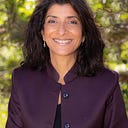The Daughter of a Partition Survivor Speaks
My mother suffered in silence. She was unable to speak of the horror’s she witnessed when she was only eleven years old. Her parents and oldest brother were killed in front of her eyes in a train headed from what is now Pakistan to New Delhi on September 21, 1947 which was ambushed and massacred in one of the deadliest years in Indian history, the Partition of 1947. The spoken recall was too unbearable for her. The images inside her had a life of their own. Alongside these, she carried intense survival guilt, one of only three who survived in the train car, on that fateful night. In her mind, she actually never left that train. Parts of her lived there for the next seventy years of her life. She was among the 14.5 million who were displaced during the India-Pakistan partition and one of the many thousands who survived while up to 2 million died, merely two years after the end of World War 2. When she and her two younger siblings got off that train, they hid in the fields, waiting to be rescued. When rescue arrived, the family of the rescuer wanted them killed and discarded for fear of being caught with children from the ‘other side’.
Was it luck or destiny? Why did she survive? She asked herself this question every day of her life for the next 70 years. My mother’s coping strategies were such that she could not allow herself to feel pleasure or joy for too long, sometimes only for minutes before she would shut it down. If her mother was killed, how could she be happy? This filter was hard wired into her brain for the rest of her life, first in the train and then with her rescuers. As her first born, I knew no details of what she carried inside every cell of her body, but felt the depth of her pain inside of me. Over the years, she shared in passing that her parents had been killed without any details of how gruesome or traumatizing this was for her; nor did she share what she witnessed and ingested for a year prior to the Partition when intolerance between Hindus and Muslims grew as politicians negotiated the end of British rule in India. They cared nothing about how people would be affected by their deal making. India was broken into two, “cracked into pieces”, as she called it, into the present day India and Pakistan where, the Hindu and Muslim majorities would have to move to these respective countries and live out the rest of their lives.
My mother lost everything during the Partition, including her dream of growing up with her family in what she remembered was the beautiful town of Pind Daden Khan. She knew nothing about differences amongst Hindu’s and Muslims. She grew up loving her Muslim brothers and sisters, members of her community, who had respect and tolerance for all faiths, all peoples and all cultures. My mother’s life was turned upside down in 1947, when she and her family had to leave their home after a fire that was intentionally started there threatening their safety. On September 21st they got on a train due to arrive in New Delhi, across the border sooner than the one they were scheduled to travel on. It barely left the station before being ambushed. The massacre of the passengers was planned.
I cannot imagine what she felt as she witnessed the unthinkable. As her first born daughter, I have lived and suffered deep emotional pain myself, whose depth I never understood until now. I now understand that its depth can was probably the result of congested emotions that my mother could not release or even bear as they were too overwhelming. I am a child of a partition survivor. There is an ironic comfort in knowing there are a probably millions of others out there like me. Growing up, my emotional pain had no meaning, definition or container. There were times when I truly felt like I was in solitary confinement with it. I could not even define it with a psychological label. It was much deeper than that. It was ‘other-worldly’.
As a teenager, I was drawn to stories of the Jewish Holocaust. I was fascinated with how survivors found meaning as well as how their children felt, what they had to bear and what they had suffered. Rachel Yehuda has researched many of them. She discovered that children of Holocaust survivors carry forth the emotional pain of their parents. She has found evidence of this transmission in their DNA. I’m sure it is helpful for them to understand their pain and to have a container that the world holds for them.
But there is no container for millions like my mother or me, my siblings or my father, a partner to a Partition survivor. The Partition of 1947 is not known to the world like the Holocaust is. Most people I speak with about this have never even heard of it. Without a container, people affected by a historical tragedy can never find healing or closure.
